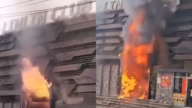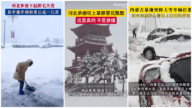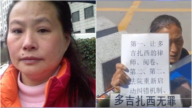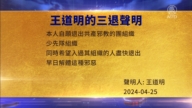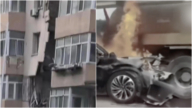【新唐人2012年3月13日訊】兩會期間,大陸國家核電技術公司董事長王炳華透露,當局將在年內恢復審批新建核電項目。對此,專家評論指出,人類直到目前還無法安全利用核能,日本福島核事故剛剛發生一週年,當全世界很多國家都在重新反思核能危機,考慮減少和停止核電站的同時,中共就計劃繼續大力發展核電,這只能說明中共當局無視民意、不負責任。
3月10號,王炳華在政協記者會上表示,「清華大學」自主研發的項目「高溫氣冷堆」,將會在今年(2012年)內正式開工建設。他預測,當局將會在年內重啟核電站新項目。
對此,「核安全信息交流中心」發起人何岸泉向《新唐人》分析指出,在中國,由於核電「大躍進」形成了巨大的利益團體,他說,王炳華很可能是代表核電利益集團放風,試探國內對恢覆核電站審批的反抗程度。但無論如何,他認為,中共當局肯定會在今年年內恢復新建核電站的審批。
何岸泉:「現在的中國(中共)政府沒有辦法管理這些權貴團體、利益集團,他們要做甚麼,政府管都管不了。為甚麼?都被收買了,所有的專家都被收買了,所有的部門都被買通了。」
王炳華還號稱:大陸的核電站開發在技術層面沒有問題,符合國際和國內核安全的要求。
「中國民主黨全委會美國委員會」主席張健:「中國的所有住房質量、學校質量、橋樑質量、食品質量,包括我們的核質量、奶粉質量,等等這些問題,它都宣稱:它是世界唯一安全的,它的技術已經達到世界頂尖水平。但是,一旦出事之後,它的問題就來了。」
張健指出,就像「溫州7.23特大動車事故」一樣,項目上馬的時候,當局鼓吹如何安全,等最終出事了,又去找各種藉口和替罪羊來推卸罪責。
與大陸的表現截然不同的是,3月11號日本福島核洩漏事故發生一週年的同時,全球很多地方,包括德國、比利時、匈牙利、香港、台灣等地都有民眾發起紀念活動,呼籲廢除核能。在日本,大批民眾前往國會表達心聲:「我們不會忘記大地震,不會忘記﹙核﹚洩漏事故。」
實際上,日本核事故之後,世界很多國家都開始重新反思核能危機,考慮減少和停止核電站。其中,核能技術領先的德國已經宣佈停止新建核電站,並將在2022年之前關閉所有核電站。
去年,大陸國務院也曾經決定,暫停新建核電站審批,對核設施進行全面安全大檢查。
王炳華在會上提到,這次大檢查中,總共發現14個需要整改的問題,但他並沒有透露詳情
旅德水利專家王維洛:「他只是說14個問題已經調查清楚了,但誰也不知道中國核電站有哪14個問題、都涉及甚麼東西。它整個這個東西是不透明的。」
王維洛指出,直到現在,核電站的核廢料處理問題一直沒有得到解決,核電站的安全根本沒有保障。
何岸泉也認為,從美國三里島、蘇聯切爾諾貝利,到去年的日本核洩漏,這些災難已經清楚表明,核電站對人類的威脅非常大,而且人類現有技術根本無法避免這類災難。何岸泉強調,這樣的大背景下,大陸當局依然準備核電「大躍進」,只能說,這是個非常不負責任的政府。
另據早先媒體報導,僅2010年深圳「大亞灣核電站」就曾發生多起安全事故,包括核洩漏事故,但當局並沒有主動予以通報。
新唐人記者劉惠、李謙、蕭宇采訪報導。
Fukushima’s Anniversary: China To Push Nuclear Power
At China’s Two Sessions, Wang Binghua, board’ chairman
of State Nuclear Power Technology Co, disclosed its plan.
Wang revealed that the Chinese Communist Party’ (CCP)
authorities will restore the nuclear power projects this year.
Experts commented that mankind still doesn’t know
how to use the nuclear energy safely.
It is one year since Japan’s Fukushima nuclear accident,
and many countries are rethinking the nuclear plants future.
However, the CCP plans are to continue and to vigorously
develop nuclear power, despite public objections.
This is indicative of CCP authorities’ disregard
and irresponsible attitude towards public opinion.
On March 10, Wang Binghua stated during a Politburo
press conference that
Qinghua’s nuclear reactor construction will officially
start this year (2012).
He disclosed that the authorities will restart
nuclear power plant projects during the year.
Nuclear safety information exchange center founder,
He Anquan told NTD that the “Big Leap” on nuclear power formed large interest groups.
He said that Wang Binghua is likely leaking this information
on behalf of the interest groups, to test its resistance in China.
Nevertheless, he thinks the CCP authorities will certainly
restore approval of new nuclear power plants this year.
He Anquan: “Nowadays the CCP government
cannot manage these interest groups.
They do what they want, everyone has been bought,
all the experts and all departments.”
Wang Binghua also claimed: “China’s nuclear power plants’
development has no issues on technical level, which is in line with international and national nuclear safety requirements.”
Chairman of China Democracy Party U.S. Committee,
Zhang Jian commented on the issue.
Zhang Jian: “On the quality of homes, school buildings,
bridges, food, including milk products, and nuclear facilities,
the CCP claims we have the only safe products in the world,
and our technology has reached the world’s top level.
However, once an incident happens,
the issues start to surface.”
Zhang continues: “Like the 7.23 High-Speed Train Accident,
the authorities boasted its safety while building it.
Once big accidents happen, the authorities would
find various excuses and victims to shift responsibility.”
Contrary to China, on March 11, one-year anniversary of
Fukushima nuclear accident, many people initiated commemoration activities in many parts of the world.
Like Germany, Belgium, Hungary, Hong Kong, Taiwan
and other places, calling for abolition of nuclear energy.
In Japan, large numbers of people went to Congress
to make their voice heard.
They proclaimed: “We will not forget the earthquake.
We will not forget the (nuclear) spill.”
After Japan’s nuclear accident, many countries are rethinking
the nuclear crisis, considering closure of nuclear power plants.
Among them is Germany,
which has the leading nuclear power plants technology.
Germany announced a freeze on new nuclear power stations,
and closure of all nuclear power plants before 2022.
Last year, China’s State Council had also decided to suspend
approval of new nuclear power plants, and to conduct a comprehensive safety inspection of nuclear facilities.
Wang Binghua mentioned during the meeting that there are
14 problems to work on. But he did not reveal any details.
Wang Weiluo (Expert, Water Conservation, Germany):
“He only mentioned of 14 problems from the investigation.
But no one knows what the 14 problems of China’s nuclear
plants are, and how big they are. This is not transparent.”
Wang Weiluo pointed out that there is no solution
on the nuclear power plants’ waste as yet.
There is no guarantee of the safety
of the nuclear power plants either.
He Anquan thinks the nuclear disasters at Three Miles Island
in US, Chernobyl in former USSR and Fukushima, Japan,
showed the nuclear power’ great threats to human kind.
Human kind’s technology cannot prevent such disasters.
He Anquan emphasized, Chinese authorities’ approval
of “Big Leap” on nuclear plants in this situation only shows its irresponsibility as a government.
According to media reports, only in 2010 many incidents
occurred at Dayawan Nuclear Plant, including a nuclear leak.
However, the CCP authorities did not proactively report
on those incidents.


